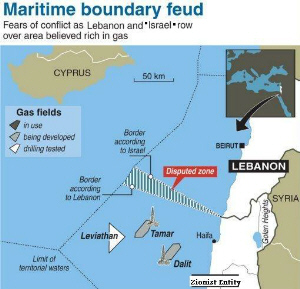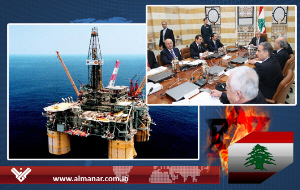Lebanon stands today in the middle of the dispute over maritime resources, with the Lebanese waters containing the largest reserves of gas compared to the neighboring countries.
 Lebanon stands today in the middle of the dispute over maritime resources, where Lebanese waters contain the largest oil reserves compared to the neighboring countries.
Lebanon stands today in the middle of the dispute over maritime resources, where Lebanese waters contain the largest oil reserves compared to the neighboring countries.
That fact poses serious challenges to be faced by the Lebanese cabinet and Parliament, responsible for ensuring an internal consensus as soon as possible to prevent any foreign attack against the country’s resources.
Cyprus announced Monday that it has commenced oil and gas exploration in the Mediterranean, an announcement that pushed Turkey to start exploration in the Turkish-Cypriot waters next week.
In this context, first positive move of PM Miqati’s government was the Monday approval of the Lebanese Exclusive Economic Zone, on the basis of the UKHO’s study, a British company specialist in topographical researches. The study showed a correspondence with the coordinates presented by the Lebanese Army experts a few years ago. Those included the confirmation of the 'Point 23' between Lebanon, Cyprus and "Israel".
Miqati ensured that maritime decrees will be issued by the end of 2011, as well as the outsourcing of drilling projects that are almost ready in the Ministry of Energy.
After the decree issuance in the Official Gazette, a copy of the file in question will be submitted to the United Nations as a prelude to re-launch negotiations with the Cypriot government to push it towards amending the agreement signed between the Mediterranean island and the Israeli entity at the expense of Lebanon.
 Moreover, Lebanese President Michel Suleiman, who arrived in New York Tuesday morning, has put Zionist infringement on the 882 km2 of Lebanese waters at the top of the agenda of his talks with world leaders, including U.N. chief Ban Ki-moon, Lebanese diplomatic sources said.
Moreover, Lebanese President Michel Suleiman, who arrived in New York Tuesday morning, has put Zionist infringement on the 882 km2 of Lebanese waters at the top of the agenda of his talks with world leaders, including U.N. chief Ban Ki-moon, Lebanese diplomatic sources said.
For their part, governmental sources have indicated that Lebanon is currently drafting a law on its oil and gas resources and it will soon adopt its economic maritime borders.
In an interview with As-Safir newspaper, Speaker Nabih Berri stressed on Tuesday that Lebanon has the right to preserve its natural resources, urging officials to speed up deals with foreign companies to drill for oil and gas in the country’s Exclusive Economic Zone.
For his part, the Minister of Energy Joubran Bassil stated that the Lebanese state should express firm stance towards Cyprus, and warn that in case the error with Israel hasn’t recovered, relations with Lebanon will be threatened.
| Zionists' map of their "claimed" maritime borders |
He also said that Cyprus should be prohibited from carrying out any action of oil and gas exploration in common areas with Lebanon.
Lebanon and the Zionist entity locked horns over the maritime border after the discovery of potential offshore energy reserves.
In July, the Zionist cabinet approved a map and submitted it to the United Nations, which has been asked to mediate the growing conflict.
The Zionist map conflicts with Lebanon's proposed borders, which give the Jewish entity less territorial waters and was submitted to the U.N. last year.
Beirut argues its map is in line with the armistice accord drawn up in 1949, an agreement which is not contested by Israel.
